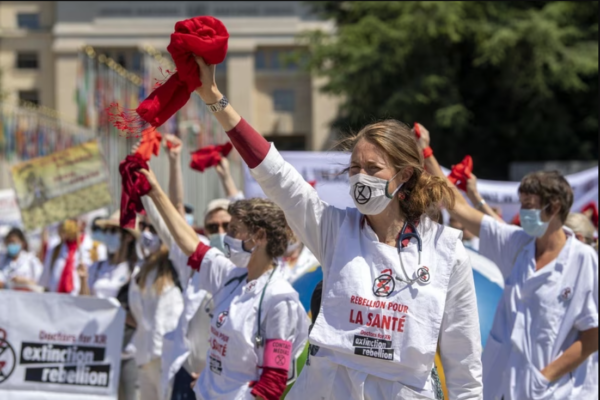Climate change activists are mobilizing for the October Swiss federal elections. Institutional politics is less rigid for this generation.
Physicians for Extinction Rebellion, a group of 40 Neuchâtel caretakers, wrote government postcards warning of the health risks of catastrophic climate change at the end of January. “What if we worked together to establish a more resilient health system that respects life?” they asked officials.
Extinction Rebellion, a British-based organization with international offshoots, has used gentler tactics to attract public and political attention since the start of this year. It still targets decision-making centers, but now it clearly seeks policy change from the inside.
People dislike civic disobedience. Recent environmental activist attacks on artworks in European museums have sparked controversy and condemnation.
Realistic activism
Extinction Rebellion Switzerland proposes citizens’ assemblies to address environmental issues. In Geneva, political parties have been invited to explore these public places where city residents may voice their opinions.
“The activism of these movements and its members is currently more realistic,” says University of Geneva political science professor Marco Giugni. The mid-1970s Kaiseraugst power plant anti-nuclear fight was ideological.
“Our research reveal young people nowadays are less reluctant to bear political responsibilities and modify behavior to fit their campaigns, particularly in terms of mobility, while being committed to their mission,” Giugni says. They take every chance. They’re less anti-establishment now.”

“Occasionally ambiguous”
Several previous campaigners are still engaged in cantonal or municipal parliaments. The “Fridays for Future” movement, started in 2018 by Swedish activist Greta Thunberg, shows how the climate movement has entered mainstream politics.
“Several of our members have joined political parties, but not the majority,” says 25-year-old climate activist Robin Augsburger from La Chaux-de-Fonds, Neuchâtel. His tactic is ambiguous since “to criticise the activities of official political institutions with climate activists in their ranks” is tough.
Climate activists joined the Green Party, Social Democratic Party, or far-left Solidarités. Surprisingly, centre-right parties like the Liberal Greens and right-wing parties. Augsburger says Young Radicals joined us early. “But Covid devastated our ranks.”
Activists use referendums and legislative resolutions to advance policies when politicians are slow. Fridays for Future Neuchâtel has proposed many motions urging the canton to invest responsibly and guarantee a sustainable and equitable future. Local parliament approved several of these motions.
The crossroads
Margot Chauderna, Young Greens co-president, relates rebel movements to politics. She claims the 2019 climate hits politicized many. “Our party is between institutional politics and radical activism.”
This activism targets multinationals, ultra-rich, and huge polluters. The Green party joins the Fridays for Future, Strike for the Future, and women’s strike, as well as other civil disobedience initiatives. Chauderna is a Fribourg legislator and former women’s strike organizer.
In Geneva, where cantonal elections are scheduled for April, activists are also pursuing political power. “Disappointed with the lack of action and wants to alter that,” Antoine Mayerat is running for parliament.
“A survival issue”
Extinction Rebellion, Fridays for Future, and Renovate Switzerland are near and far from politics. Ideologically engaged youth distrust institutional politics, which might depoliticize them.
How can I trust my life to politicians who cannot act? Renovate Switzerland’s representative, Cécile Bessire, said, “It’s just an issue of survival.”
“We won’t campaign before the federal elections,” she declares. I’ll vote. My pick. Everyone’s free.” She’s undecided.
Elections’ limitations
Physicians for Extinction Rebellion, a local political party in Neuchâtel for a year and a half, distrusts governmental institutions even more.
“We have no interest in the elections because elective democracy has reached its limits due to the inability of political institutions, driven by lobby groups and the constant desire to be re-elected, to take courageous and necessary decisions in the interests of the population,” the Neuchâtel collective said anonymously.
The collective claims its purpose is to put pressure from outside without an intermediary. Nonetheless, these white-coated activists believe political reform is vital. This is why citizens’ chambers or assemblies are preferable. Hope more municipalities and cantons take action. This is one of the only ways to improve things, including federally.”

